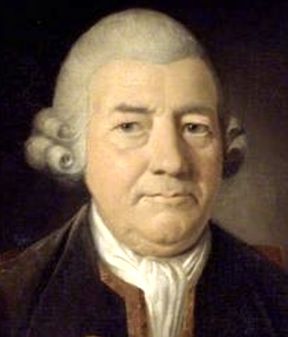On this date in 1706, John Baskerville was born in Wolverley, Worcestershire, England. At age 17 he was engraving tombstones and at 20 started an engraving business. At 32 he took up the then-popular lacquering process known as japanning that made him wealthy. Baskerville was an early mentor to Matthew Boulton, who built Watt’s steam engines. He was also a good friend of fellow printer Benjamin Franklin, who visited him when he was U.S. ambassador to France.
In his early 40s he started applying his engraving skills to printing and typography and produced the first of the Baskerville fonts. Cambridge University Press hired him as its printer and there, in 1763, he printed his great masterpiece: “After five years’ labor, he produced what might have been the most beautiful Bible yet made,” wrote John H. Lienhard, University of Houston emeritus professor of engineering and history. “The contradiction was that Baskerville was an atheist! And he was no closet unbeliever. He was an outspoken iconoclast.”
Francis O’Regan of the Birmingham (UK) Skeptics isn’t so sure, writing in June 2011: “There is no doubt he was Anti-clerical and he obviously had little respect for revealed religion but those confirmed facts don’t necessarily support the idea he was an Atheist. It is just as likely that he was a Deist like his beloved Voltaire.”
He instructed that he wished to be buried in unconsecrated ground and composed his own freethinking epitaph. By interesting coincidence, the typeface used for many years by FFRF’s publication Freethought Today is Baskerville Times. (D. 1775)


